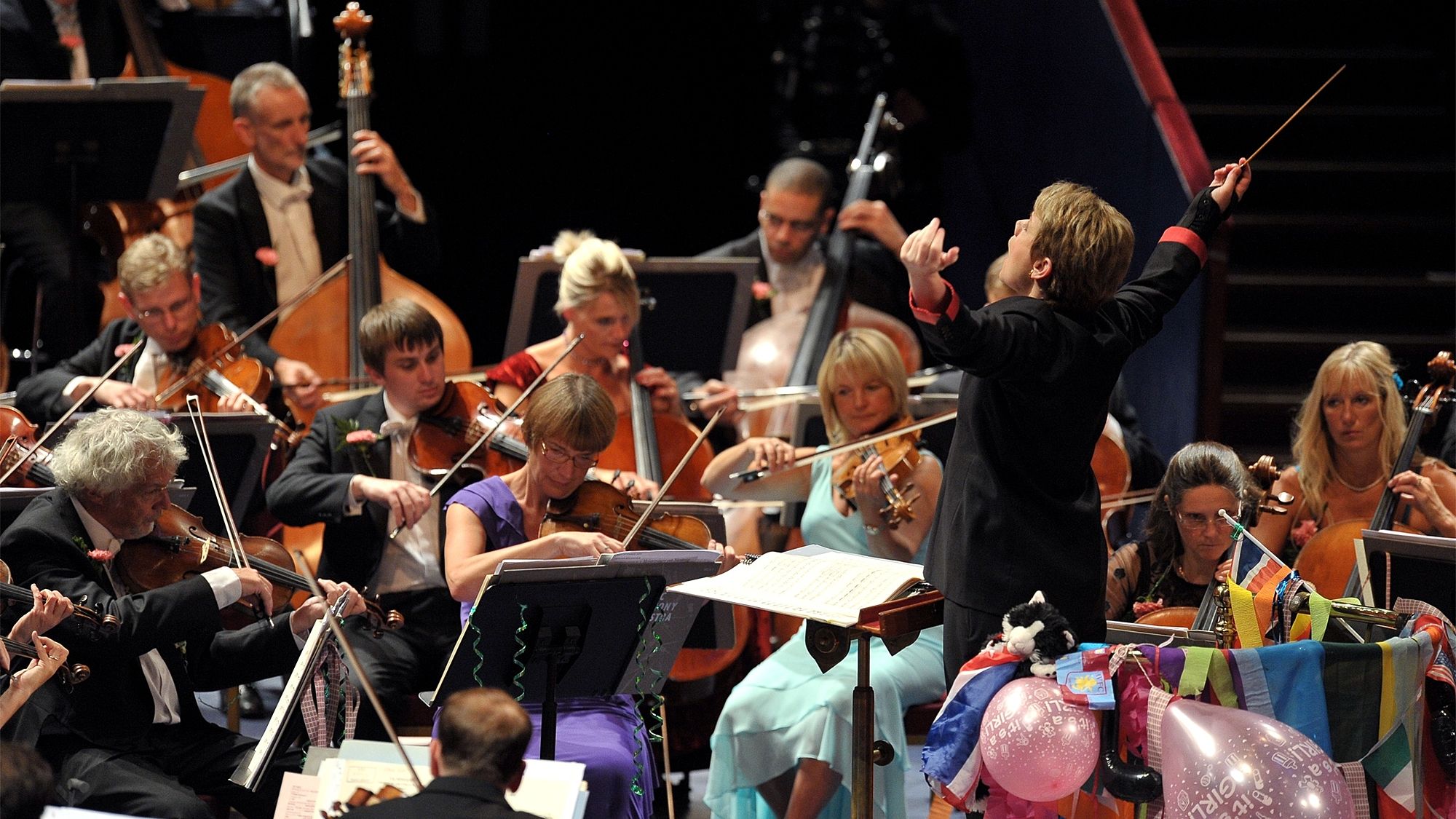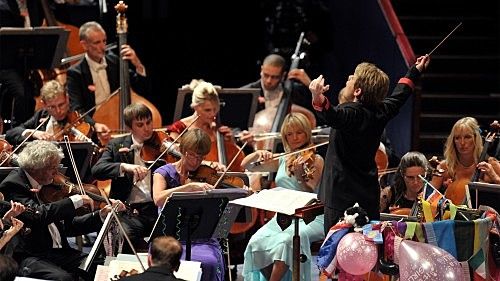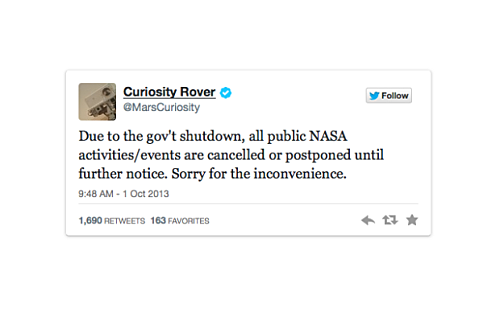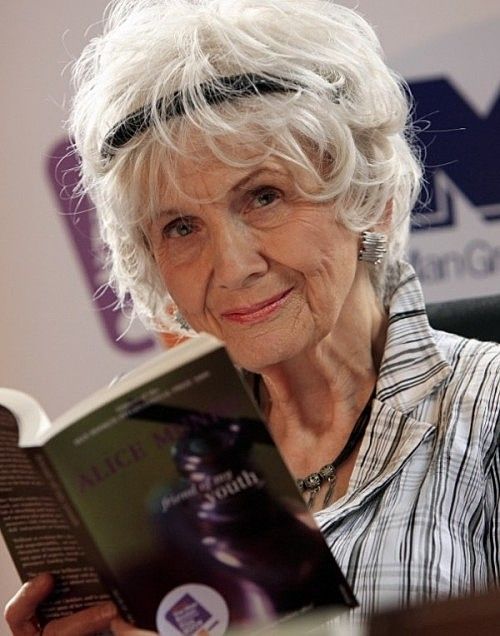Internet Histories | 14 October
Female conductors, the US government shutdown, writing for fun and profit and Alice Munro.
This fortnight:
Female conductors | the US government shutdown |
writing for fun and profit | Alice Munro
Bronwyn
Marin Alsop is my new celebrity crush. In September, she became the first woman to conduct the Last Night of the Proms, and she didn’t shy away from the political significance of this in a speech to the audience during the performance: “I’m still quite shocked that it can be 2013 and there can still be firsts for women.” (She then goes on to talk about the value of arts education, which offers a “new world of possibility” where people “can see a different future for themselves.” A total hottie.)
But fuck me, generally it’s still a pretty grim outlook for women conductors, and lately there’s been an outbreak of ill considered opinions recently about them. Amongst various dumb-dumb heads spouting off about women being “weak” and a distraction to players, the head of conducting at one of France’s most prestigious music schools, the Conservatoire National Supérieur de Musique et de Danse de Paris (who, quelle surprise, is a white, middle aged man) was recently quoted as saying that, amongst other reasons there aren’t more female conductors is that:
the profession of a conductor is a profession that is particularly testing physically; sometimes women are discouraged by the very physical aspect: conducting, taking a plane, taking another plane, conducting again… is quite challenging.
I know that I, personally, always require a long lie down in a dark room with a cold compress even after a twenty minute trip on a train, so I’m not sure what would happen if I took a flight!
In an explanation afterwards he says that mostly the problem is that many women want to have children and they can’t balance the demands of childcare and lengthy rehearsals. ARGH KILL ME.
Writer Jessica Duchen says we need to stop asking the question “Where are all the women conductors?” and instead ask “Why aren’t they getting the gigs?” With the help of her readers, she’s compiled a list of quite a few of them (including NZer Holly Mathieson) and explains:
Some people want to blame us journalists for their lack of recognition, but with concert review space tighter than it has ever been in history, it is usually the "big gigs" that get the attention, and the women conductors - with the exception of Marin and the Last Night of the Proms - are not being given the big gigs.
I had a quick look through the conductors used by the New Zealand Symphony Orchestra and Auckland Philharmonia Orchestra this year. The APO’s conductors are resolutely male, and resolutely European/ American/ Australian/ Pakeha. The NZSO does slightly better, with two Chinese (male) conductors and one woman in their line up. (It will depressingly surprise no one, I’m sure, that it’s not just women who aren’t getting the conducting jobs: there’s also very few African, or Asian, male conductors standing in front of professional orchestras either - something that Mantovani, to his credit, notes).
I started writing about all of this, and then remembered the time at music school that a teacher offered up the opinion that, physically, it was more difficult for women to conduct because breasts might get in the way. And how none of the really talented female musicians I was there with are conductors now. And then I felt really very tired, so it’s probably best if you read Anastasia Tsioulcas’ really good and comprehensive round up of various articles and links about the whole bamboozling mess here.
In happier news, here’s the best cover of a Guns N’ Roses song ever.
Matt
There are currently 883,392 human beings in the employ of the US Federal Government who – for two weeks, today – are going without money for rent, groceries or clothes. How easily would you be living without having been paid for a fortnight? Most of us could do it. Most of us could not do it comfortably.
As of writing, the US gummint has not paid these people about 2.5 billion dollars, though that number increases constantly – 2.5 bill not added to the federal debt! Not to mention an addition 170 million in unpaid food vouchers, which would usually have been divulged to the nation’s most needy. That’s some mean as austerity.
As the rest of the world looks on with incredulous bemusement, a column in Esquire from the start of the shutdown captures the Twilight Zone-esque fact that this has even happened in the first place best:
We have elected the people sitting on hold, waiting for their moment on an evening drive-time radio talk show.
We have elected an ungovernable collection of snake-handlers, Bible-bangers, ignorami, bagmen and outright frauds, a collection so ungovernable that it insists the nation be ungovernable, too. We have elected people to govern us who do not believe in government.
It’s as if there are a million universes out there, and this is the only one in which the most powerful government on the planet is held hostage to some well-off white dudes from hella-gerrymandered electorates refusing to accept the reality that a law designed to help 25 million Americans has been put in place. When Mephistopheles apparates to collect John Boehner’s soul, I hope he feels it’s been worth it.
‘Government shutdown’ is kind of a misnomer, though, isn’t it? The three branches of federal government – legislature (Congress), judiciary (the courts) and the executive (the President and his Cabinet) – are still getting paid, still lurching along at about the same efficacy. In any other country we wouldn’t say the government was shut down. We’d say it was trying its damnedest to actively harm the citizens who’d elected it.
How much harm, precisely, is being done? It’s impossible to quantify, 2.5 billion dollars notwithstanding. To take one example though, let’s talk about science. Ninety-seven per cent of NASA employees are currently not being paid to sit at home. They’re at risk of lawsuit for even checking their work emails. That’s 17,701 of the brightest people on the planet sitting in enforced idleness, deliberately prevented from enlarging the storehouse of humanity’s knowledge.
Fourteen days ago they had to put the rover Curiosity, currently exploring a crater on a different planet, in safe mode. Can you imagine trying to explain this situation to a person 100 years in the past? “We produced an autonomous robot servant and sent it on a rocket ship to explore a distant planet, but after it descended successfully from the sky on pillars of flame we decided to shut it down because we didn’t want to give the poors healthcare.”
There’s a great editorial in last week’s Nature, perhaps the foremost academic science journal in the world, that captures my indignation:
The damage being done to science — the slow business of meticulous data gathering — is not as immediately apparent as in other arenas. But it is insidious. A missed moment in a data campaign may not reveal its importance until much later. A talented scientist, fed up with budget vagaries, might seek greener pastures.
Nearer home, the planet’s driest continent, Antarctica, is getting even bleaker:
The partial closure of the US base could see many projects stalled until next year, Foreign Affairs Minister Murray McCully said.
"The science programmes and the research work, which is of course where we see a lot of collaboration with the US, obviously has been suspended at this moment, and it's highly questionable whether they can restart it in the context of the current year,'' he said today. "So a lot of the really good work we do in collaboration with the US will be paused for some time.''
My techno-utopian dreams are fading as surely as the US hegemon. On the upside, if the Dow crashes it’s going to be a lot cheaper to buy shit online for a while.
*
One of the things that I have feelings about is when authors are interviewed and they give advice for the budding critic, novelist or poet. These feelings are indistinct and change depending on the alignment of Venus and Mercury, but generally they are negative. “Keep at it!” “You’ll make it one day!” “Stay true to yourself!”
Yeah, well, dude’s gotta eat. The best thing on writing I’ve read in the last month comes from a self-confessed hack:
What I’m saying is that I’m a hack. “Hack” is supposed to be an insult because real writers are supposed to be dedicated to perfection, not to money. But the fact is that the vast majority of writers, the vast majority of the time, have to embrace some not insignificant level of hackery if they’re going to survive. Anthony Marra doesn’t have to troll Craigslist for gigs anymore, and so it makes sense from his perspective to say something like, “When the frustrations accumulate and you want to give up, keep in mind that your solitary struggles to shape language into meaning will become the most profound moments of your creative life.”
His advice rings true in some vaguely disappointing, comforting way. Last year I worked as an editor for a large company’s travel and tourism department. When they realised that as well as being properly incensed by misplaced apostrophes I could string a sentence together, I soon found myself writing travel magazines in tourist-speak: meaningless near-jargon that nonetheless imbued a sentence with a very specific aesthetic cadence. Endless vermillion vistas, dusty desert sunsets, sangria in the sun. Alliteration and a thesaurus will take you places, if only in writing. It was write-by-numbers routine work, but I didn’t hate it, and it paid my rent, and I was honest-to-god writing for a living.
Jobs like that aren’t rare, and writing for money’s okay, and there’s no formula for artistic success. Is that right? Are those things that everyone knows?
Meanwhile, at the end of last week an American author*, Alice Munro, won the Nobel Prize for Literature. Americans don't win it too often, so it's a fairly meaningful achievement. A couple of years ago, a short story she wrote on growing up in the 1930s and 40s appeared in the New Yorker - if you've got some time, give it a read. It's kind of great:
At first, it was not too bad. Her eyes only rarely turned up into her head in a wandering way, and the soft down from an oversupply of saliva was just visible around her lips. She could get dressed in the mornings with some help, and she was able to do occasional chores around the house. She held on to some strength in herself for a surprisingly long time.
You would think that this was all too much. The business gone, my mother’s health going. It wouldn’t do in fiction. But the strange thing is that I don’t remember that time as unhappy. There wasn’t a particularly despairing mood around the house. Maybe it was not understood then that my mother wouldn’t get any better, only worse. As for my father, he had his strength and would have it for a long time yet.
* It turns out even a cursory google would have revealed Munro is Canadian, not American. Oops. Those poor yanks just can't catch a break.





